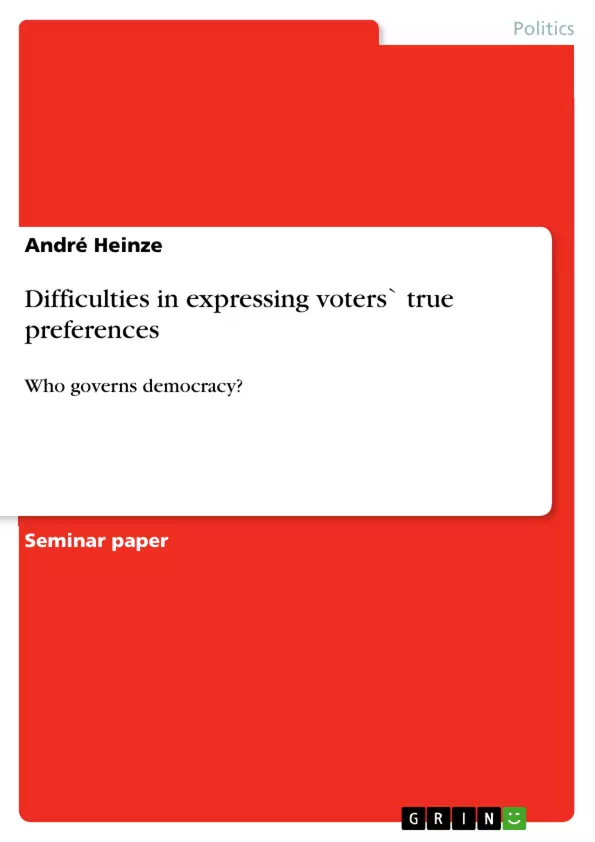This paper shows that it is quite unlikely that voters are able to express their true preferences sufficiently.
In the first part I assume a voter who is aware of his own true preferences. However, the electoral system offers an incentive to vote strategically. In such a situation the voter is aware that he doesn`t express what he favours most, but what he thinks he can support without wasting his vote. I will show that it is possible to limit the incentive for voting strategically either by the choice of the electoral system or by the abolishment of polls.
The second part shows first that it is quite unlikely that a voter is able to identify his true preferences, either because of Hume`s problem of Induction or because of complexity. Complexity is enhanced when Media comes into the game, because voters have to consider both the argument and those who created the argument.
Therefore it is necessary to show, that Media has an incentive to collude. If one assumes Media to collude it doesn`t explain why voters` preferences are shaped. Preferences are shaped either due to media`s creation of mutual beliefs or by persuasion. Persuasion refers to complexity, because it is rather difficult to consider additionally the interests of those who created a certain media product.
However, votes are expressed and aggregated. But whose or what preferences are that?
Inhaltsverzeichnis (Table of Contents)
- Introduction
- Strategic Voting as intended falsification of voters` true preferences
- A critique on Lijphart`s disproportionality measure
- Incentives for Strategic Voting under different Electoral Systems
- How to reveal voters` true preferences
- How to design the electoral system
- A lack of information for more sincere voting?
- Conclusion
- Media as Instrument for shaping voters` expressed preferences
- Why voters cannot express their true preferences
- Hume's Problem of Induction
- The paradox of voting
- How Media shapes voters` expressed preferences
- Why there is collusion
- Shaping voters` expressed preferences
- The Creation of mutual beliefs
- Persuasion
- Whose and What kind of preferences are expressed?
- Conclusion
Zielsetzung und Themenschwerpunkte (Objectives and Key Themes)
This paper aims to explore the difficulties in expressing voters' true preferences in democratic systems. The paper examines how strategic voting and media influence the accuracy of voter representation.- Strategic voting as a distortion of true voter preferences
- The impact of electoral system design on strategic voting
- The role of media in shaping voter preferences
- The limitations of voters' ability to identify their true preferences
- The influence of media collusion on expressed preferences
Zusammenfassung der Kapitel (Chapter Summaries)
The paper begins by introducing the problem of voters being unable to express their true preferences accurately, highlighting the role of strategic voting and media influence. Chapter 2 focuses on strategic voting, exploring how voters may act strategically to avoid "wasting" their vote. It delves into critiques of Lijphart's disproportionality measure, highlighting the importance of considering the psychological effect alongside the mechanical effect. This chapter also examines incentives for strategic voting under different electoral systems. Chapter 3 shifts to the role of media in shaping voter preferences, analyzing the factors that hinder voters from accurately identifying their true preferences, including Hume's problem of induction and the complexity of decision-making. It examines how media collusion can influence voters' expressed preferences through the creation of mutual beliefs and persuasive tactics.
Schlüsselwörter (Keywords)
This paper explores the complexities of democratic representation, focusing on the challenges of voter authenticity and the role of media influence in shaping voters' expressed preferences. Key concepts include strategic voting, electoral system design, voter information, media collusion, and the creation of mutual beliefs.Frequently Asked Questions
Why is it difficult for voters to express their true preferences?
Voters often face difficulties due to strategic voting incentives provided by electoral systems and the role of media in shaping or distorting perceived choices. Additionally, complexity and Hume’s problem of induction make it hard for voters to identify their own true preferences.
What is strategic voting in this context?
Strategic voting occurs when a voter supports a candidate or party they do not favor most, but believe has a better chance of winning, in order to avoid "wasting" their vote.
How can the incentive for strategic voting be limited?
The paper suggests that incentives for strategic voting can be limited through the specific design of the electoral system or by the abolishment of public opinion polls.
How does the media influence voter preferences?
Media can shape expressed preferences through collusion, the creation of mutual beliefs, and persuasion. This complexity makes it difficult for voters to separate the arguments from the interests of those creating the media content.
What are the key themes of this paper?
The key themes include strategic voting, the impact of electoral system design, media collusion, Hume's problem of induction, and the challenges of democratic representation.
- Quote paper
- André Heinze (Author), 2006, Difficulties in expressing voters` true preferences, Munich, GRIN Verlag, https://www.hausarbeiten.de/document/116411


